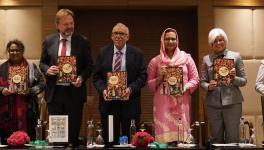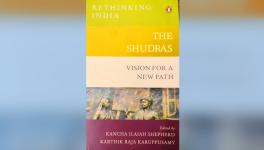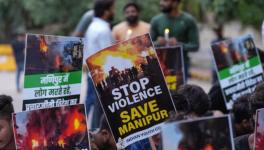Bharat Nyaya Yatra and Challenge of Restoring Faith in Justice

The Bharat Nyaya Yatra from Manipur to Mumbai, led by Congress party leader and Member of Parliament Rahul Gandhi, is set to begin on 14 January 2024. It promises to mobilise people by reaffirming their faith in the lofty goals of the Constitution: Its ideas of social, economic and political justice. It is set to contrast sharply with the divisive communal narrative relentlessly disrupting people’s unity and solidarity.
Justice in Idea of India
It is evident that the Yatra hopes to make justice its central theme, for which the Congress party’s announcement that it will begin in Manipur is crucial. In Manipur, peoples’ rights have been trampled upon. The constitutional machinery failed to protect Manipur’s people when sudden violence erupted there this summer. Therefore, the starting point of the Yatra has the potential to generate hope that the public discourse would centre on shared concerns. It can reinforce the notion that everybody in India is entitled to justice regardless of their faith or any other identity. Just when there is hype and hysteria generated around the faith of the majority, the mobilisation of people around nyaya, or justice, can instil confidence in India’s composite culture and pluralism.
Justice in Practice
The announcement of the Yatra can fire the people’s imagination. It can become a catalyst to bring one of the enduring theories of justice into practice, specifically John Rawls’ theory of justice from the 1970s. The American political theorist set in motion a positive discourse that posits the ideals of liberty, equality, fraternity, and justice in terms of real-life access to education, livelihood, health care, and other primary necessities. The idea of justice in practice sets in motion social and political forces that continue to impact governance worldwide.
Deepen Public Reasoning
The Bharat Nyaya Yatra has set in motion a process of debates evocative of the freedom struggle. Mahatma Gandhi described the Dandi March and his other movements as an assertion of Indian people against foreign rule and home-grown injustices such as untouchability and patriarchy. He firmly believed that contesting and uprooting both forms of repression required deepening public reasoning, not violence.
“Peace will not come out of a clash of arms but out of justice lived and done,” he said. The Bharat Nyaya Yatra, like the Bharat Jodo Yatra, is a form of sparking public reasoning. It is a means of democratically reaching out to people. It requires people to be educated about their constitutional entitlement to justice in all forms, political, social or economic, and then attempt to seek it out in practice through democratic means.
BR Ambedkar’s Ideas
BR Ambedkar gave the electrifying slogan, “Educate, Agitate, Organise”, which Prof Amartya Sen and Jean Dreze discuss at length in their book, An Uncertain Glory: India and its Contradictions. They write, “Ambedkar, the champion of the socially and economically discriminated (who did not shy away from challenging the Indian nationalist leaders for their absence of engagement with ‘economic and social democracy’), insisted that we have reason to pursue, rather than lose faith in, the power to ‘educate, agitate and organise’.”
The writers continue: “But, as Ambedkar argued, organisation and agitation must be based on good and informed reasoning. The first item in his call, ‘educate’, is important here… We are much inspired by Ambedkar’s vision of informed and reasoned public engagement. The important task is not so much to find a ‘new India’ but to contribute to making one.”
So, Bharat Nyaya Yatra represents the audacity of hope based on public reasoning in making a new India, where justice would uphold the vision of India framed during the freedom struggle, which the majoritarian push and polarisation politics are denting.
Smothering Dissent
In this age of neo-liberalism, marked by the surge of crony capitalists seeking to control an ever-larger share of economic resources, injustice is bound to multiply. Combined with deepening inequalities, social, economic and political justice have become a chimaera. High unemployment rates and inflation have created an atmosphere of injustice for millions of Indians, particularly hurting the prospects of the youth.
The ruling regime is pursuing crony capitalism, which it promised to fight, and smothering dissent. In particular, questions raised against the economic model being followed, including in Parliament, are being suppressed. A record 146 Members of Parliament from the Lok Sabha and Rajya Sabha were recently suspended. They had protested in Parliament, demanding a statement from the Home Minister on the recent Parliament security breach.
Those Opposition leaders were functioning as legislators ought to: by holding the government accountable for events that unfold when it is in power.
The government’s lack of legislative accountability is a form of injustice. Bharat Nyaya Yatra can become a transformative movement to usher in justice by holding the government accountable--but first through deepening public reasoning.
The author served as Officer on Special Duty to President of India KR Narayanan. The views are personal.
Get the latest reports & analysis with people's perspective on Protests, movements & deep analytical videos, discussions of the current affairs in your Telegram app. Subscribe to NewsClick's Telegram channel & get Real-Time updates on stories, as they get published on our website.
























